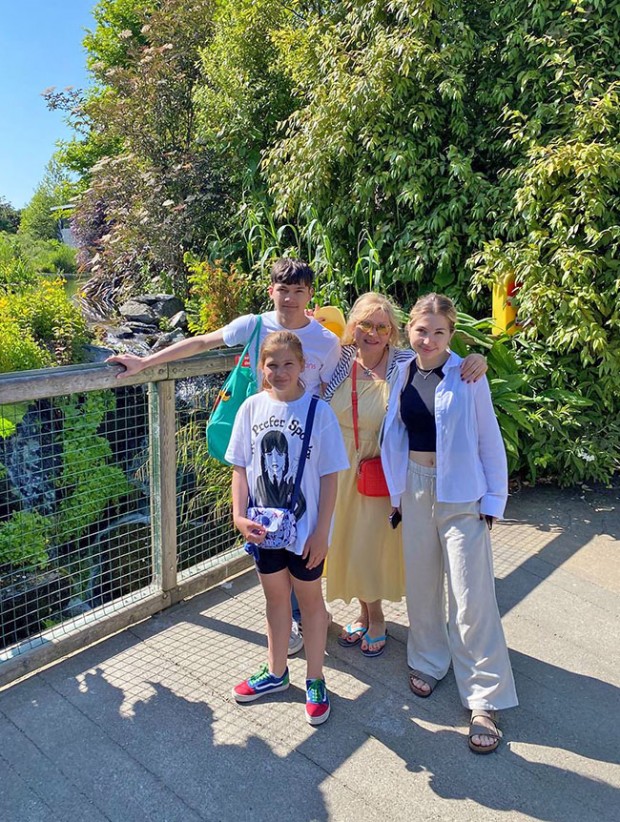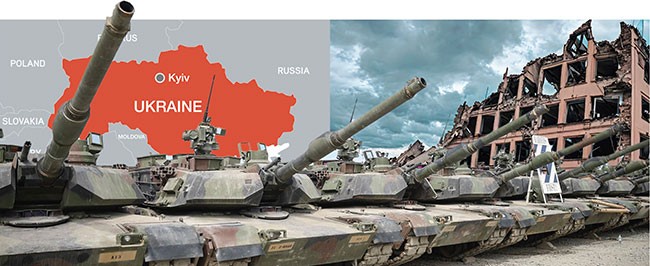30 November 2023 Edition
A shared history of resilience

• Olena Kolomoitseva and her grandchildren Oryna, Taras, Polina
Ukrainian families’ new chapter in Ireland
By June 2023, there were over 83,000 Ukrainian refugees spread in communities all across Ireland. Karina Savchuk is Ukrainian and lives in Ireland. Here, she gives an insight into the experience of recently arrived refugees from the war in Ukraine.
• — • — • — • — • — • — •
In recent months, Ireland has become a sanctuary for many Ukrainian families seeking refuge and safety.
There are many reasons why Ukrainian families are choosing Ireland, including rich culture, nature, people, and education. One primary appeal is the English language, which not only breaks barriers but also opens numerous professional opportunities.
For most Ukrainian people, mastering the language is very important as it helps to bridge integration into the socio-economic landscape of Irish society. They come with valuable skills, particularly in sectors such as mechanics, engineering, teaching, and most importantly healthcare professionals, who are eager to contribute positively and effectively.
Olena Kolomoitseva and her grandchildren arrived in Ireland last autumn from the city of Donetsk, which is currently under occupation. Olena and her family found safety in Carlingford, County Louth.
“My story is very similar to others”, says Olena, “We ran from the occupation. We had a terrible experience.
“In February 2022, when active hostilities began, we were in the city of Donetsk. At that moment, our family was torn apart. Our oldest granddaughter was in Kyiv, studying at the National Technical University, while I was renting a place in Kramatorsk. However, the war reached us even in Donetsk. My daughter’s family were in Donetsk; her oldest daughter was in Kyiv, and the youngest was with her in Donetsk.
“After a week of intense fighting, we decided to take the children and go. I have a brother in Poland, we decided to join him there. The older granddaughter who was in Kyiv made her way to Poland, and I had to travel from Donetsk with the two younger children, aged 10 and 15 years old.”
Olena continues, “My son-in-law had to hide because of the forced recruitment of men into the military service to fight, and many men were in hiding. My daughter had to stay with him.
“I took the children, and we had to flee to Poland. We were truly hoping it wouldn’t be for long, thinking that after two or three months, it would all be over, and we could return home. We were also hoping that Donetsk would be liberated. However, after some time, we realized that returning in the near future wouldn’t be possible for us.”
Olena describes Poland as an amazing country but explains, “However, our oldest granddaughter speaks English really well, and the grandson also knows some English”.
“Due to the language barrier in Poland, my grandson couldn’t continue his education. We had to consider relocating to an English-speaking country where he could continue his studies, and we could also make ourselves useful. I had to put the children’s needs first.”
Olena explained that, “I didn’t know much about Ireland. The only thing I knew was that Ireland was accepting refugees. I was unfamiliar with the conditions or any other details.
“Now, I understand that this was the right decision. We are happy with everything here. Over time, we have begun to return to a normal life.
“My oldest granddaughter managed to find a job, she has a good employment and really enjoys it. My grandson is studying at school, and the youngest granddaughter attends elementary school.
“I am also intensively studying the English language. I realize how crucial it is to learn the language to make full use of the knowledge and education I have. I truly hope that I will be successful.

“In relation to the ‘political life’ of Ireland, I initially knew nothing about it. However, given that we are now living here and our city remains under occupation, we are currently tying our future to Ireland”.
“I’ve begun to immerse myself in social media to understand more about the social and political dynamics here. Even President Biden visited our city of Carlingford.
“We also have a robust Ukrainian community in Carlingford. Together, we’ve been creating placards, and engaging in other activities. We try to participate as much as we can in local community life.
“I am profoundly grateful to Ireland, it’s a wonderful country with amazing people. While we really want to return to our homes, the reality is quite different at the moment.”
Olena’s family is just one among thousands whose lives have been shattered by the ongoing war in Ukraine. It is no secret that many Ukrainians will be staying in Ireland for an extended period, simply because many don’t have anywhere to return to.
The question of whether these individuals wish to participate in community life is also resoundingly answered: yes, they do.
An increasing number of Ukrainians are striving to make positive contributions to society. However, what can Ireland expect from this integration? Will we see Ukrainians participating in local elections or engaging in activism?
The political ethos of Ireland is markedly different from Ukraine. The local politics of the 26 Counties operate within a stable framework that encourages community engagement. Unlike in Ukraine, where political turbulence has often overshadowed civic activism. Ireland offers an environment where local activism can flourish and voices are heard.
The interest in political life perhaps finds its echo in a shared historical resilience; Ukraine’s Revolution of Dignity and Ireland’s path to unity. Both nations have narratives marked by the struggle for sovereignty, identity, and independence.
The Irish path to unity, a democratic and peaceful aspiration to bring together the North and South, reflects in the Ukrainian people’s own pursuit for a definitive cultural and political identity, particularly evident during the 2014 Revolution of Dignity.

The Revolution of Dignity has left a deep, defining, and unforgettable mark on history. Its significance lies not in the official documents. After all, paper can bear anything. However, the revolution’s ideals, hopes, and resolutions have profoundly altered Ukrainian people’s mentality, initiating and continuing to build our new political identity.
Similarly, Irish history has been fraught with its own form of revolution, a fight for independence and self-governance. A revolutionary Irish Republic based on the enduring principles of equal rights, prosperity and happiness, equal opportunities, civil liberty for all its citizens, and the unfettered control of people’s own destiny.
While the contexts differ between Ukraine and Ireland, the core spirit resonates; a yearning for dignity, national pride, and a better future for coming generations. We are living in a historic period of political and constitutional change and together we can be part of that change.
For Ukrainians in Ireland, these parallels are more than historical footnotes. They are sources of inspiration, drawing from which they seek to contribute to Ireland’s ongoing story of unity, growth, and prosperity. They perceive the importance of active participation in local politics and community life, understanding that every stride towards a more inclusive and fair political system back home was a result of civic engagement and often, sacrifice.
By involving themselves in Ireland’s community activities and local governance, Ukrainians are not just integrating, they are enriching the Irish societal mosaic with their heritage of perseverance and a deep-seated desire for democratic values.
This article is an edited extract from Eoghan Mac Cormaic’s forthcoming the book ‘Captive Columns: Prison Papers 1867-1999’, which will be published in 2024.



